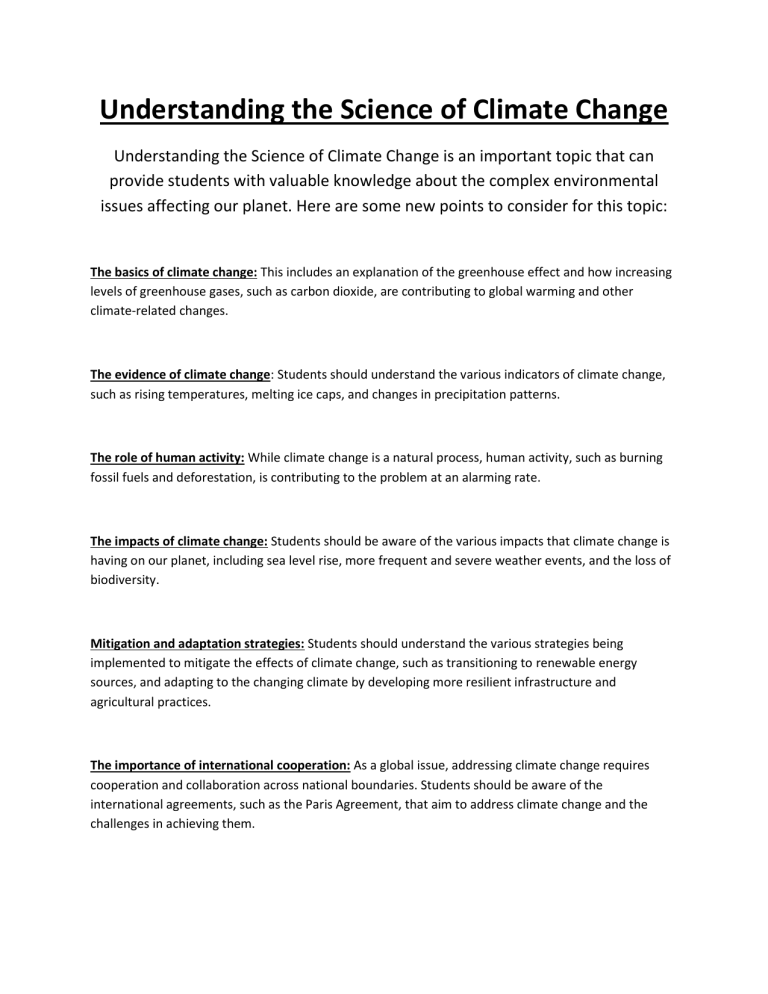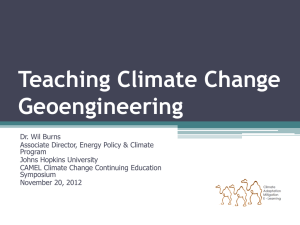
Understanding the Science of Climate Change Understanding the Science of Climate Change is an important topic that can provide students with valuable knowledge about the complex environmental issues affecting our planet. Here are some new points to consider for this topic: The basics of climate change: This includes an explanation of the greenhouse effect and how increasing levels of greenhouse gases, such as carbon dioxide, are contributing to global warming and other climate-related changes. The evidence of climate change: Students should understand the various indicators of climate change, such as rising temperatures, melting ice caps, and changes in precipitation patterns. The role of human activity: While climate change is a natural process, human activity, such as burning fossil fuels and deforestation, is contributing to the problem at an alarming rate. The impacts of climate change: Students should be aware of the various impacts that climate change is having on our planet, including sea level rise, more frequent and severe weather events, and the loss of biodiversity. Mitigation and adaptation strategies: Students should understand the various strategies being implemented to mitigate the effects of climate change, such as transitioning to renewable energy sources, and adapting to the changing climate by developing more resilient infrastructure and agricultural practices. The importance of international cooperation: As a global issue, addressing climate change requires cooperation and collaboration across national boundaries. Students should be aware of the international agreements, such as the Paris Agreement, that aim to address climate change and the challenges in achieving them. The role of scientific consensus: The overwhelming majority of climate scientists agree that climate change is real, largely caused by human activity, and a significant threat to our planet. Students should understand the importance of scientific consensus in shaping policy decisions. The social justice dimensions of climate change: Climate change disproportionately affects vulnerable communities, such as low-income populations and indigenous peoples. Students should understand the social justice implications of climate change and the need for equitable solutions. The intersection of climate change and public health: Climate change is linked to a range of public health issues, including air pollution, heat-related illnesses, and the spread of disease. Students should be aware of the potential health impacts of climate change and the importance of addressing them. The economics of climate change: Students should understand the economic implications of climate change, including the costs of inaction and the potential benefits of transitioning to a low-carbon economy. The role of individual action: While addressing climate change requires large-scale policy changes, individual actions can also make a difference. Students should understand the ways in which they can reduce their carbon footprint and contribute to a more sustainable future. The role of technology in addressing climate change: Technology, such as renewable energy sources and carbon capture and storage, can play a significant role in reducing greenhouse gas emissions and mitigating climate change. Students should understand the potential of technology and innovation in addressing climate change. The challenges of international cooperation: Climate change is a global issue that requires international cooperation and coordination. Students should be aware of the challenges in achieving this, such as differing priorities among countries and political barriers to action. The potential tipping points and feedback loops: Climate change can trigger feedback loops and tipping points, such as the melting of polar ice caps and the release of methane from permafrost, which can accelerate the rate of warming. Students should understand the potential consequences of these tipping points and the need for urgent action. The role of activism and advocacy: Climate change activism, such as the youth-led Fridays for Future movement, has brought attention to the urgency of the issue and spurred political action. Students should understand the role of activism and advocacy in creating change and promoting sustainability. The potential role of geoengineering: Geoengineering, such as reflecting sunlight back into space or removing carbon dioxide from the atmosphere, is a controversial and largely untested approach to mitigating climate change. Students should understand the potential risks and benefits of geoengineering and the need for further research and caution in implementing such approaches. Understanding the science of climate change is crucial for our present and future. It is a complex issue that requires a multidisciplinary approach to comprehend its causes, effects, and possible solutions. By studying this topic, we can become aware of our impact on the planet and how to minimize it. We can also support research and policies that address climate change and contribute to a more sustainable future for ourselves and the generations to come.





